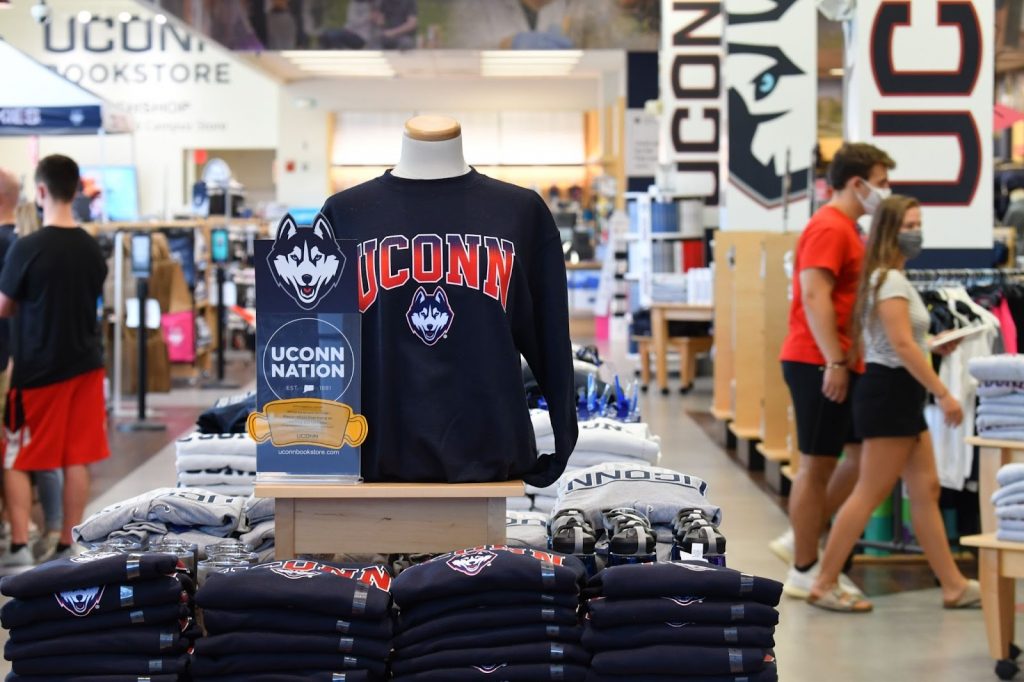Whether you are reading this on a phone, desktop computer, or paper printout, UConn’s Shareen Hertel wants you to know that you are connected to the people who make and deliver these products as part of an “interactive dance we call consuming and living on a daily basis.”
“If I’m eating strawberries in the middle of the winter,” Hertel reflects, “that means someone in Mexico had to pick them.”
Understood within the vast system of power and privilege that constitutes the global supply chain, this hypothetical strawberry becomes a primary reference point for Hertel’s interdisciplinary work at UConn. As Professor of Political Science jointly appointed with the Human Rights Institute she researches transnational human rights advocacy, co-directs the Economic and Social Rights Program she co-founded, and edits The Journal of Human Rights.
“The role I principally play is a translator,” says Hertel, explaining that she translates concepts of economic rights across disciplines and between institutions and worker-driven forums, all the while considering how to use a human rights frame to work for economic justice and decent living and working standards.
Yet Hertel’s work has direct material impact both inside and outside academia. The efforts of her long and varied career are visible at any university and wherever college apparel is worn. Certainly, they are felt wherever these garments are produced.
Look around any UConn classroom and you will see a multitude of Husky sweatshirts and UConn-branded and licensed hats. Since the COVID-19 pandemic you will also see university-provided face masks. All these products are sourced according to ethical supply chain guidelines established by the UConn President’s Committee on Corporate Social Responsibility, which Hertel has served on since 2005.
Additionally, prospective vendors seeking to do business with UConn receive the university’s “Vendor Code of Conduct” during the bid process. This document articulates the minimum legal standards as well as preferential expectations around environmental and social responsibility. These standards “move the needle,” according to Hertel, “by valuing these issues and creating a groundswell of attention.”
“Anyone partnering with us is on notice,” she says.

How UConn became a model for ethical supply chain management is a story Hertel credits to the “synergies” that developed over the years between students, the institution, and the field of human rights.
But Hertel was already part of this movement long before she came to UConn. In the 1990s she worked for a variety of United Nations agencies and nongovernmental organizations, and served as a consultant to the Ford Foundation. This entailed working with Toys “R” Us, Reebok, and a number of other S&P 500 companies to promote supply chain transparency in global networks reaching from the United States to Cambodia, El Salvador and Bangladesh.
About 3% of the global apparel market is licensed and branded collegiate apparel. While Hertel was busy working on getting corporations to disclose their suppliers, college students were steadily becoming more active on ethical issues surrounding campus supply chains.
So by 2004, when Hertel arrived at UConn, she had already been working for many years on social and environmental accountability in the global apparel market. In the years since, whenever students have protested around UConn’s supply chain, Hertel has been more than prepared to work with them.
Today that 3% of the apparel market “has done a 180” in terms of transparency and social responsibility. Student engagement at UConn has transformed too, moving from a protest-driven approach to one of structural engagement. Students sit alongside Hertel on the President’s Committee on Corporate Social Responsibility, and alumni now work for social responsibility auditors such as the Fair Labor Association. In May 2021 UConn won global recognition for its broad commitment to sourcing practices, an achievement that exemplifies the legibility of Hertel’s work outside the academy as well as her pragmatic approach.
“I write and teach about how to change value structures,” says Hertel, “but those value changes don’t happen overnight.”
Hertel is aware that her incrementalist approach distinguishes her from many in her field. Along the reformist-to-revolutionary continuum she identifies as a reformist, willing to work within institutions to expose incongruities and inconsistencies – changing them from within. Her research emphasizes data informed by the experience of real workers.
“My whole life has been informed by the reality that we need a revolution,” she says, “but an all-or-nothing theoretical revolution can’t happen if we strand people along the way while going for a perfect outcome.”
If the questions that drive Hertel are complex, her first principle of engagement is clear. How do we interrogate the systems of power and privilege embedded in the global supply chain and transform them toward economic justice? How do we chip away at structural advantage while appreciating the precarity and resilience of workers?
“You have to honor the work first,” Hertel says. “Always honor the work.”


